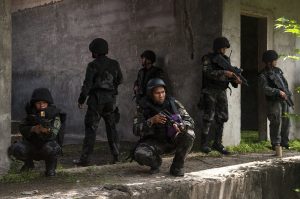[ad_1]
ASEAN Beat | Politics | Southeast Asia
An apparently drunk officer killed a 52-year-old mother, leading the country’s new police chief to order some police to wear body cameras.

Members of the Philippine National Police Maritime Group take part in a military training exercise in Puerto Princesa, Philippines, July 6, 2014.
Credit: Flickr/DMA Hawaii Forward Center
Lilibeth Valdez, a 52-year-old mother, was killed on Monday in Quezon City by an off-duty police officer who appeared to be drunk. The killing was caught on video, igniting demands for police to fulfill a promise made four years ago and begin wearing body cameras.
The killing was quickly condemned by Philippine National Police (PNP) chief Gen. Guillermo Elezear, who promised significant reforms after he was appointed last month.
Valdez was grabbed by the hair and shot in the neck at close range in front of her children by Sgt. Hensie Zinampan in a video that went viral and sparked outrage. Several media outlets reported Zinampan had previously been involved in a fistfight on May 1 with Valdez’s son.
To the public, the killing was reminiscent of a December 2020 incident, also caught on video, in which a mother and son were brutally killed by a plainclothes police officer.
Both incidents have reopened wider criticism of police impunity in the country, which had already been under the spotlight after the Department of Justice said it would allow investigators access to files related to 61 cases in which police officers could be charged for drug war killings.
The department promised the United Nations Human Rights Council in February it would investigate some drug war killings, and Justice Secretary Menardo Guevarra admitted for the first time the police had failed to examine many weapons used in the drug war.
President Rodrigo Duterte, however, said earlier this week some cases would not be investigated due to national security concerns and said deaths in anti-drug operations may be inevitable in the future.
“If you want to get [the records], we can’t give everything – not because we are hiding some facts that [are] known to us but unknown to you. But national security issues are part of this,” Duterte said.
In 2018, the Philippine Supreme Court ruled that drug war records do not constitute matters of national security. The Duterte administration, however, has not embraced this view.
Duterte also said that rights groups and critics of his administration should not be surprised that drug suspects die in police operations. “You will wonder why many of them were killed,” he said. “It’s because my police and my army, they are trained to kill.”
Duterte also claimed such operations are legitimate and that drug suspects are killed when they fight back. The PNP has long claimed that victims of the drug war, along with victims of politically motivated killings, are killed after fighting security forces.
The abysmal track record of the police under the Duterte administration has led to skepticism over Elezear’s promises of reform, especially after the killing of Valdez. Since his appointment, Elezear has vowed to punish “dirty” cops but has also defended police brutality in some instances.
The PNP on Friday finally deployed four body cameras for 600 policemen who are trained to use them. Elezear said the same day that the deployment of the body cameras was not related to the killing of Valdez and was merely coincidental.
The police force has 2,692 additional cameras in its inventory, but has not put them into use due to issues with establishing and teaching protocols.
[ad_2]
Source link